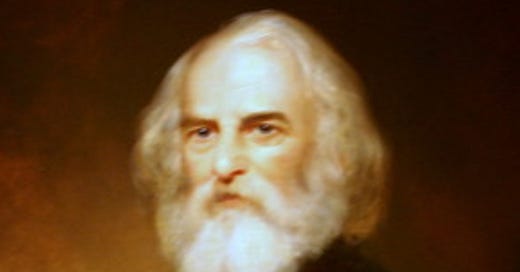Today is the anniversary of the 1807 birth of the great Henry Wadsworth Longfellow, arguably the quintessential American poet.
Longfellow was the grandson of Revolutionary Patriot General Peleg Wadsworth and the nephew of Henry Wadsworth, who died at Tripoli. Through childhood, college, professorship, international travels, marriages, fatherhood, and poetic career, Longfellow always held on to his ideals, including his patriotism. “Paul Revere’s Ride” and “Hiawatha” are magnificent examples of the best of Americanism passionately alive and strongly moving. There are villains and failings and sins in Longfellow’s poetry, but he truly believed that every man and woman can be great, that each individual can reach the heights, physical or moral (and regardless of race—he was firmly anti-slavery). That is why he is so particularly an American poet, our nation’s storyteller.
America has produced many great writers, but ironically many of the most famous and popular literary Americans—Flannery O’Connor, T.S. Eliot, Steinbeck, and Henry James, for instance—apparently had a worldview at stark contrast with what most Americans, especially most admirable Americans, possessed. The people of the United States were once renowned for their optimism, their hope for the future, their enthusiastic admiration for the humble and ordinary, their innovative ideas and inventions. Yet many if not most American authors have been, though brilliant, also pessimistic, nihilistic, and/or elitist. Not so Henry Wadsworth Longfellow.
Longfellow was not naive, of course—there is great tragedy in his poems, there is death and there is regret and there is war. But what is both so Christian and so American about Longfellow is that whether his tales end happily—like “The Courtship of Miles Standish”—or whether they end in death—like “Evangeline” or “Excelsior”—they all show a belief in redemption. No death is meaningless in Longfellow, no sacrifice wasted, no defeat final. The young man who died climbing the mountain in “Excelsior” is “beautiful” in death, because he died achieving something great. As Evangeline holds her dead former lover, she recognizes that their painful and sorrowful search is over and prays, “Father, I thank thee!” Hiawatha is devastated by his wife’s death, but his story ends with him welcoming the Catholic missionaries in gladness and setting off:
In the glory of the sunset,
In the purple mists of evening,
To the regions of the home-wind,
Of the Northwest-Wind, Keewaydin,
To the Islands of the Blessed,
To the Kingdom of Ponemah,
To the Land of the Hereafter!
Whether he wrote about Europeans or Americans or native tribes, whether his heroes and heroines were fictional or historical or a blend of both, whether he wrote about Christians or Jews or pagans, Longfellow made his characters unforgettable and his descriptions beautiful. His words linger in the mind, and the images created by those words are so much a part of American culture that even those who don’t remember the poems have been touched by them.
As an example of some of the best of Longfellow’s poetry, I would like to end with the conclusion of “Paul Revere’s Ride,” predicting that the American spirit and love of liberty will prevail in all times just as it did at our nation’s founding:
So through the night rode Paul Revere;
And so through the night went his cry of alarm
To every Middlesex village and farm,—
A cry of defiance, and not of fear,
A voice in the darkness, a knock at the door,
And a word that shall echo forevermore!
For, borne on the night-wind of the Past,
Through all our history, to the last,
In the hour of darkness and peril and need,
The people will waken and listen to hear
The hurrying hoof-beats of that steed,
And the midnight message of Paul Revere.




